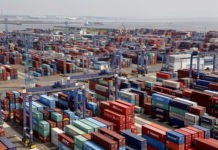
In 2019, cargo shipping via Latvian ports slowed 5.7 percent year on year to 62.4 million tons, the Baltic country’s Transport Ministry informed Monday, January 20.
According to data from the ministry, bulk cargo made up 35 million tons of the ports’ combined cargo turnover last year, which is a reduction of 6.3 percent from 2018.
The amount of liquid cargo handled at Latvian ports in 2019 was down 3.1 percent year on year to 14.6 million tons. Reloading of general cargo was down 7.2 percent to 12.8 million tons, which included 4.9 million tons of containerized cargo.
Riga continued to lead other Latvian ports by cargo turnover with 32.7 million tons reloaded in 2019, down 10.1 percent from a year before. Riga Port handled 52.5 percent of all cargo reloaded in the Latvian ports in 2019.
Read more on Xinhua.





